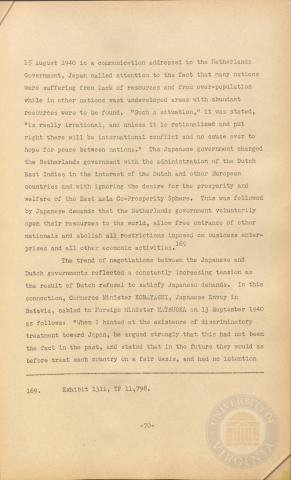
Page 70
| Parent | Japanese - German - Italian Collaboration |
|---|---|
| Date | |
| Language | English |
| Collection | Tavenner Papers & IMTFE Official Records |
| Box | Box 14 |
| Folder | Japan, Germany, Italy Collaboration and Introduction |
| Repository | University of Virginia Law Library |
15 August 1940 in a communication addressed to the Netherlands
Government, Japan called attention to the fact that many nations
were suffering from lack of resources and from over-population
while in other nations vast undeveloped areas with abundant
resources were to be found. "Such a situation," it was stated,
"is really irrational, and unless it is rationalized and put
right there will be international conflict and no cause ever to
hope for peace between nations." The Japanese government charged
the Netherlands government with the administration of the Dutch
East Indies in the interest of the Dutch and other European
countries and with ignoring the desire for the prosperity and
welfare of the East Asia Co-Prosperity Sphere. This was followed
by Japanese demands that the Netherlands government voluntarily
open their resources to the world, allow free entrance of other
nationals and abolish all restrictions imposed on business enter-prises and all other economic activities. 169
The trend of negotiations between the Japanese and Dutch governments reflected a constantly increasing tension as the result of Dutch refusal to satisfy Japanese demands. In this connection, Commerce Minister KORAYASHI, Japanese Envoy in Batavia, cabled to Foreign Minister MAiSUOKA on 13 September 1940 as follows: "When I hinted at the existence of discriminatory treatment toward Japan, he argued strongly that this had not been the fact in the past, and stated that in the future they would as before treat each country on a fair basis, and had no intention
169Exhibit 1311, TP 11,798.
